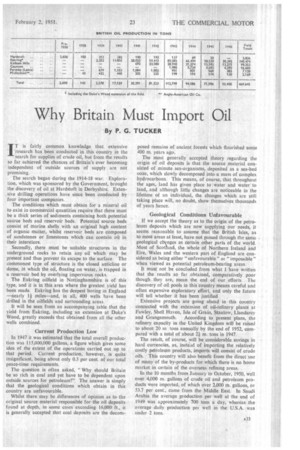Why Britain Must Import Oil
Page 59

If you've noticed an error in this article please click here to report it so we can fix it.
By P. G. TUCKER
IT is fairly common knowledge that extensive research has been conducted in this country in the search for supplies of crude oil, but from the results so far achieved the chances of Britain's ever becoming independent of outside sources of supply are not promising.
The search began during the 1914-18 war. Exploration, which was sponsored by the Government, brought the discovery of oil at Hardstoft in Derbyshire. Extensive drilling operations have since been conducted by four important companies.
The conditions which must obtain for a mineral oil to exist in commercial quantities require that there must be a thick series of sediments containing both potential source beds and reservoir beds. Potential source beds consist of marine shells with an original high content of organic matter, whilst reservoir beds are composed of sandstones or limestones which can contain oil in their interstices.
Secondly, there must be suitable structures in the underground rocks to retain any oil which may be present and thus prevent its escape to the surface. The commonest type of structure is the closed anticline or dome, in which the oil, floating on water, is trapped in a reservoir bed by overlying impervious rocks.
The Eakring oilfield in Nottinghamshire is of this type, and it is in this area where the greatest yield has been made. Eakring has the deepest boring in England -nearly li miles-and, in all, 400 wells have been drilled in the oilfields and surrounding areas. '
It will be seen from an accompanying table that the yield from Eakring, including an extension at Duke's Wood, greatly exceeds that obtained from all the other wells combined.
Current Production Low
In 1947 it was estimated that the total overall production was 115,01)0,000 gallons, a figure which gives some idea of the extent of the operations carried out up to that period. Current production, however, is quite insignificant, being about only 0.3 per cent. of our total peace-time requirements.
The question is often asked, "Why should Britain be so rich in coal and yet have to be dependent upon outside sources for petroleum?" The answer is simply that the geological conditions which obtain in this country are unfavourable.
Whilst there may be differences of opinion as to the original source material responsible for the oil deposits found at depth, in some cases exceeding 16.000 ft., it is generally accepted that coal deposits are the decom
posed remains of ancient forests which flourished some 400 m. years ago.
The most generally accepted theory regarding the origin of oil deposits is that the source material consisted of minute sea-organisms, deposited as a sea-bed ooze, which slowly decomposed into a mass of complex hydrocarbons. This means, of course, that throughout the ages, land has given place to water and water to land, and although little changes are noticeable in the lifetime of an individual, the changes which are still taking place will, no doubt, show themselves thousands of years hence.
Geological Conditions Unfavourable
If we accept the theory as to the origin of the petroleum deposits which are now supplying our needs, it seems reasonable to assume that the British Isles, as to most areas at least, have not passed through the same geological cNnges as certain other parts of the world. Most of Scothand, the whole of Northern Ireland and Eire, Wales and the western part of England are considered as being either "unfavourable" or "impossible" when viewed as potential petroleum-bearing areas.
It must not be concluded from what I have written that the results so far obtained, comparatively poor though they are, mean the end of our efforts. The discovery of oil pools in this country means careful and often expensive exploratory effort, and only the future will tell whether it has been justified
Extensive projects are going ahead in this country connected with the extension of oil-refinery plants at Fawley, Shell Haven, Isle of Grain, Stanlow, Llandarcy and Grangemouth. According to present plans, the refinery capacity in the United Kingdom will be raised to about 20 m tons annually by the end of 1952, compared with a total of about 24 tn. tons in 1947.
The result, of course, will be considerable savings in hard currencies, as, instead of importing the relatively costly petroleum products, imports will consist of crude oils. This country will also benefit from the direct use of many of the by-products for which there is no home market in certain of the overseas refining areas.
In the 10 months from January to October, 1950, well over 4,000 m. gallons of crude oil and petroleum products were imported, of which over 2,000 m, gallons, or 53.7 per cent., came from the Middle East. In Saudi Arabia the average production per well at the end of 1949 was approximately 700 tons a day, whereas the average daily production per well in the U.S.A. was under 2 tons.




























































































